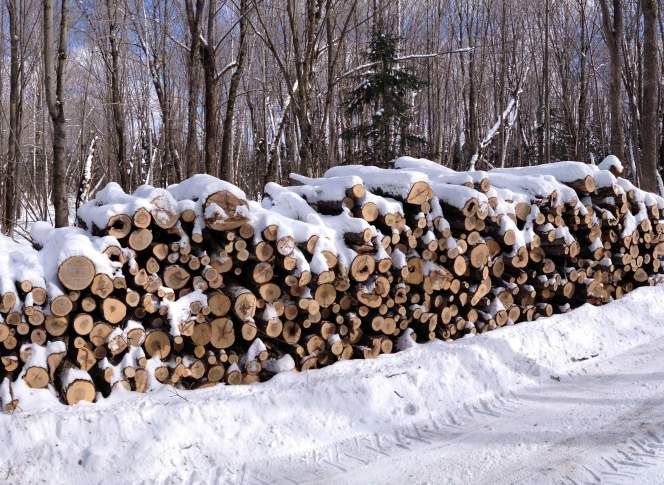Timber, Dairy Industries In Wisconsin Weigh U.S.-Canada Trade Relations
Timber has long been a contentious issue in the trade relationship between the United States and Canada.
May 8, 2017

Winter logging with stack of logs in snow

Timber has long been a contentious issue in the trade relationship between the United States and Canada. In Wisconsin, wood is a multi-billion-dollar industry. The state exports more than $2 billion in timber products, with forest products its accounting for 12 percent of Wisconsin’s exports to Canada. Wisconsin also exports nearly half a billion dollars in paper and paperboard to Canada each year, making that the largest product category of state exports to Canada.
Agriculture is another major sector of Wisconsin’s exports to Canada, and dairy products are at the center of another trade dispute. While a global glut of milk has driven down prices for several years, a change Canada made to its dairy pricing policy made it hard for some Wisconsin farms to sell their milk at all.
Wisconsin’s loggers have had their share of ups and downs too, and are trying to figure out whether their industry will gain anything from President Donald Trump’s rumblings on renegotiating the North American Free Trade Agreement governing trade among the U.S., Canada and Mexico. Trump’s recent decision to add a 20 percent tariff on softwood lumber imports from Canada may appear to be an impulsive retaliation to that nation’s dairy pricing action, which the president criticized during an April speech in Kenosha.
However, the U.S. and Canada have a long history of bickering over wood and imposing tariffs upon each other. In fact, the George W. Bush administration imposed a 27 percent tariff on Canadian softwood imports in 2002. Meanwhile, Canada is considering additional trade actions against the U.S.
Wisconsin’s dairy and timber producers now face the uncertainty of an upheaval in trade relations, on top of the usual volatility that markets and weather visit on both industries. Matt Jensen, vice president of the Great Lakes Timber Association, and Don Radtke, vice president of the Wisconsin Farm Bureau Federation, offered their perspectives on this double whammy on the May 4, 2017 edition of Wisconsin Public Radio’s Route 51.
Jensen, a third-generation logger, said he’d welcome a renegotiation of NAFTA and other federal policies that benefit domestic lumber producers. He also noted other challenges loggers have experienced recently in Wisconsin, and likely will continue to face, even absent any changes in U.S. trade policy. Winters in Wisconsin are getting wetter and warmer due to climate change, and in some years the El Niño cycle exacerbates those conditions. During the winter, logging crews need frozen ground to get into forests and efficiently transport harvested trees. Shorter winters and muddy conditions can therefore directly impair loggers’ ability to supply timber to domestic and international markets.
“The last couple years have been extremely tough,” Jensen said. “We’ve had an extremely wet year and we’re starting [with] a lot of rainfall, and we’re very weather-dependent in our industry.”
The most visible parties in Wisconsin’s recent dairy dispute, besides Trump and Canadian Prime Minister Justin Trudeau, have been the dozens of farmers who abruptly lost their contracts with a processor. (Most found a new buyer for their milk, at least temporarily.) Jensen explained that loggers can face the same situation if the market takes an unfavorable turn. Just as dairy farmers don’t get paid if their milk doesn’t get to a processing plant, loggers don’t get paid if their timber doesn’t get to a mill. Both the dairy and timber industries depend on processing to increase the value of their products, and so they can experience similar kinds of volatility.
“Our contracts that we have with various paper mills, in a phone call they can be stopped,” he said. “We really are at a large risk, always have been, and I don’t know how to solve that problem in our industry, but it’s always been like that.”
Radtke agreed with Jensen that renegotiating NAFTA could help Wisconsin dairy producers, though he said his organization was concerned with talk about scrapping it entirely, which Trump recently tempered a bit by saying he’d just renegotiate it. He also explained how American dairy producers’ current issues with Canada differ from the tariff concerns in the lumber business. Canada’s recent shift in dairy pricing policy will incentivize purchasing ultra-filtered milk produced within that nation.
Radtke said this specific category of milk is important because it’s intended to be shipped for processing into cheese and other products.
“They’re taking the water out of it and it’s concentrated,” he said. “The fat, protein and other solids are still in, they’re just basically pulling as much water out of it as they can so they’re not trucking water around.”
Canada’s policy change still effectively discourages American exports there, but through a less direct mechanism than tariffs.
“It wasn’t really that they put a tariff on it,” Radtke said. “We could still send it there, but at the reduced price it’s not profitable for the plants to do it.”
 Passport
Passport











Follow Us